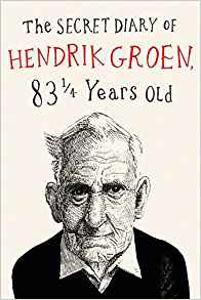
This sly commentary on aging and retirement communities was originally published in Amersterdam, The Netherlands in 2014. It has been translated into more than 20 languages and become an international best seller.
This is NOT “Dave Barry Does Aging.” Nor is it a clinical/philosophical treatise on coping with advancing age. Instead, the reader is presented with life as it really is – an unpredictable mixture of declining health, continuing spirit, loss of family and friends, joy and comfort in old and new friends, sorrow, and happiness. This book can reflect your own feelings and experiences, make you chuckle at its sharp dissection of others’ faults, ambush you with recognition of your own shortcomings, and satisfy you with its appreciation of the human condition. It will delight you at times and offend you at others.
On January 1, 2013, Hendrik Groen begins a year-long chronicle of his life in a continuing care community in Amsterdam. He doesn’t hold back:
"Another year, and I still don’t like old people. Their walker shuffle, their unreasonable impatience, their endless complaints, their tea and cookies, their bellyaching. Me? I am eighty-three years old."
Soon we are introduced to the residents who make Hendrik’s life difficult: Mrs. Voorthusizen, who “inadvertently parks her enormous bottom right on top of the pastries,” fat Mr. Bakker who yells, “I taste horse” in the middle of dinner and causes everyone to reject their entrees, and Mrs. De Leeuw, who is “always apologizing for whatever’s gone wrong around her, just to be on the safe side.” He does have a small group of close, sympathetic friends. With these friends, Hendrik forms the Old But Not Dead Club. They begin to plan outings for themselves, and are soon called snobbish by the other residents.
The community and its administration are also targets of much criticism. There are condescending postings on the bulletin board, restrictions on residents’ movements, and refusals to provide information deemed “private.” Residents retaliate with small acts of sabotage – cake crumbs in the aquarium and counter-postings on the bulletin board that are soon removed. The larger world doesn’t escape Hendrik’s gaze; the government threatens to cut pensions and the FiftyPlus Party represents the interests of “young seniors” only.
Nevertheless, Hendrik can see all sides of problems:
"Use it or lose it. You have to keep both body and mind active, especially the prefrontal cortex, the part of the brain that controls functions such as planning, initiative, and flexibility." Well, we may presume that the management of this place doesn’t care much about the prefrontal cortex. Neither money nor trouble is spared to keep the oldies docile, passive, and lethargic, camouflaged by bingo, pool, and “Feel Good Fitness”:
"Let me not, however, place the blame squarely on the staff. The inmates are only too willing to let themselves be coddled and patronized. And let’s be honest, I do understand the temptation sometimes. There are days when I don’t mind being a bit of a lazybones myself."
Groen reads that children laugh 100 times a day, adults only 15, and suspects that seniors score even lower. He begins to observe fellow residents and finds “five haven’t smiled for three days straight.” A few laugh too often, something he finds annoying, and everyone laughs more after a good social hour. Many of us laugh, he concludes, “because you’re too spineless to reveal you didn’t think the joke was funny.” Or perhaps because you didn’t hear the joke, I might add.
The Secret Diary discusses sickness, infirmity, and death. It includes several discussions of assisted suicide, which is legal but highly regulated in The Netherlands. A few terms may need explaining because of differences between European and American usage; “mobility scooter” is, of course, an electric scooter or wheel chair. and “rollator” is a walker.
The Secret Diary of Hendrik Groen offers a realistic look at life, aging, and death. It is a wise commentary on how people choose to pass their later years, offering some advice on how to find enjoyment in these years. The note upon which the diary ends is pitch-perfect. I found this a highly satisfying read, and something that I will be turning over in my brain for months to come. --Susan Sheridan